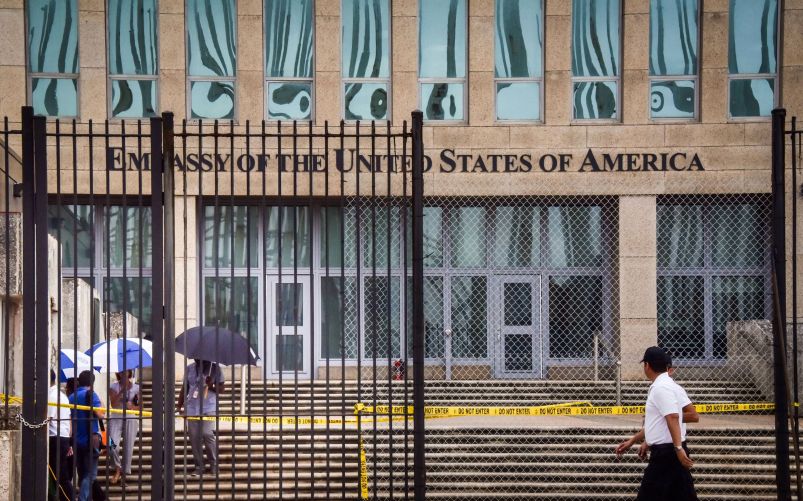WASHINGTON (AP) — Medical tests have confirmed that one additional U.S. Embassy worker has been affected by mysterious health incidents in Cuba, the State Department said Thursday, bringing the total number to 25.
The new “medically confirmed” worker is one of two who were recently evacuated from Cuba after reporting symptoms. State Department spokeswoman Heather Nauert said the other worker is “still being evaluated” by doctors. Prior to the newest incident, the most recent medically confirmed case from Cuba had been in August 2017, Nauert said.
“All of this is still an ongoing investigation,” Nauert said.
The confirmed Cuba patients have been found to have a range of symptoms and diagnoses including mild traumatic brain injury, also known as concussions. They and others suspected to be affected have been brought for testing to the University of Pennsylvania, where specialists in brain injury enlisted by the U.S. government have been screening, treating and studying American personnel evacuated from both Cuba and China.
The 25 U.S. workers affected in Cuba are in addition to one American government worker at a U.S. consulate in China who also confirmed to have been affected, raising concerns that the incidents occurring in Cuba have spread. Dozens more U.S. workers at diplomatic outposts in China are being tested, including some brought back to the U.S. for more advanced testing.
The United States has said that the Cuba incidents started in late 2016. The State Department calls them “specific attacks” but has not said what caused them or who was behind them. Cuba has adamantly denied involvement or knowledge. Initial speculation centered on some type of sonic attack owing to strange sounds heard by those affected, but an interim FBI report in January found no evidence that sound waves could have caused the damage, The Associated Press has reported.
The new confirmation comes less than a week after the U.S. renewed demands on Cuba to determine the source of health “attacks” on U.S. diplomats. Cuba responded by once again denying any involvement or knowledge of any such attacks.
At a senior-level meeting with Cuban officials in Washington last Thursday, the State Department said it had again raised the issue, which has prompted a significant reduction in staffing at the U.S. Embassy in Havana. It reiterated “the urgent need to identify the source of the attacks on U.S. diplomats and to ensure they cease.”
Cuba has denied any knowledge of the source or cause of the incidents that have sickened at least 24 diplomats since late 2016, leaving some with brain damage and the top Cuban embassy at the talks told the AP after the meeting that his delegation had objected to the U.S. description of what had happened to the Americans as “attacks.” He noted that neither American nor Cuban experts had been able to determine what caused the symptoms. He renewed concerns that the Trump administration is using the incidents as an excuse to roll back U.S.-Cuba rapprochement started under the Obama administration.
In a statement, the Cuban Foreign Ministry said it urged the U.S. government “to desist from the continued political manipulation of the alleged health cases.” Its delegation also demanded the lifting of what it described as an “arbitrary” travel warning which it said hinders scientific, academic, cultural, religious and entrepreneurial exchanges, and visits by Americans.
In China, the State Department has issued a series of health alerts to Americans in China after a worker at the U.S. Consulate in Guangzhou reported symptoms and strange sounds and was flown to the U.S. That worker was then medically confirmed to have “suffered a medical incident consistent with what other U.S. government personnel experienced in Havana, Cuba,” the department has said.



